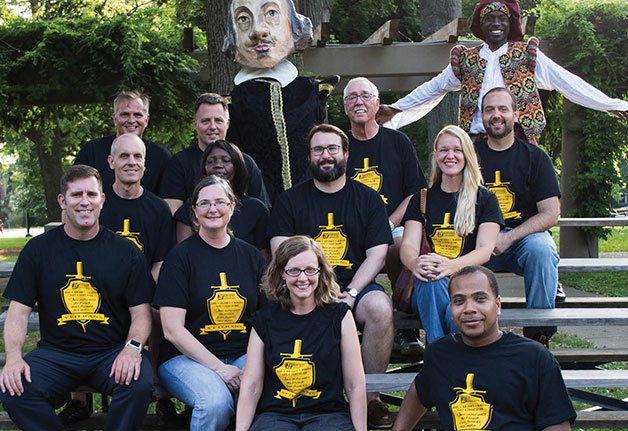Wofford College is woven into the entire fabric of the life of retired U.S. Army Col. Fred Johnson ’85 (top left) — basketball and cross-country; a love of writing; long-lasting relationships with professors, classmates and teammates; and William Shakespeare.
“It is my belief that no one speaks more directly to the warrior’s heart than William Shakespeare,” says the 29-year veteran who served four combat tours in both Iraq wars, Afghanistan and Bosnia and battled his own longtime, private war with PTSD after returning home.
It was that personal battle that led Johnson to create Shakespeare with Veterans as a way for veterans like him to heal, build community and use the playwright’s words to help them deal with post-traumatic stress and reintegration into society.
He was inspired by the impact of a similar program, Shakespeare Behind Bars, on inmates — lowering recidivism rates and helping them come to terms with their difficulties in life.
Shakespeare with Veterans has three objectives — provide a place to heal, create an opportunity for camaraderie and connect America’s military to its people. “What we wanted to do is bring our group of veterans up and put it all on the line, so the public can see that these are the people that go to war for us,” he says of the first program presented in July 2016 in Louisville, Ky., as a program of Kentucky Shakespeare.
“My interest and love of Shakespeare started at Wofford,” Johnson says, who received degrees in government and sociology. “One of my professors, the late John Cobb, built a whole program around Shakespeare and his works.” Johnson thought of all the war scenes in Shakespeare classics, such as “Richard III,” “Macbeth” and “Henry V.” It was the birth of Shakespeare with Veterans.
Johnson has woven other elements of his Wofford experiences through his written life story, his recently published book “Five Wars: A Soldier’s Journey to Peace.” The first chapter, “March Madness,” describes being in Baghdad at “the Surge in Iraq” while also harkening back to his days at Wofford as a basketball player.
“Thoughts of going pro were extinguished early in my collegiate (basketball) career,” he writes. “I started taking ROTC classes and quickly found that my athleticism and skills honed directing Wofford’s offense and defense were skills the Army valued. Going into my junior year of college, part of my basketball scholarship got cut. ... I had to find a way to make up the difference, so I applied for an ROTC scholarship and got it. I killed two birds with one stone: I got money for school, and I would have a job when I graduated.”
Johnson intended to stay in the Army only the required time and to serve as a personnel and administration officer. Instead, he was commissioned an infantry officer and made a career of it.
His time at Wofford was spent, too, forming long-lasting relationships. “In the gym playing pickup basketball, I talked to John Lane ’77 (then teaching English) a lot, and that was the beginning of my writing career.” Through mentoring from Lane and Dr. Deno Trakas (now the Laura and Winston Hoy Professor of English), Johnson began writing, including a short story that won the Benjamin Wofford Prize.
“These relationships were a wonderful way to learn,” he says. “Telling stories is what I really valued the most — I was able to think, reflect and learn.” Johnson also fondly recalls his relationships with Jack Seitz (then a professor of government) and Ab Abercrombie (professor emeritus of biology), who served in the 101st Airborne in Vietnam. “Even before the ROTC program at Wofford, Ab planted the seed in my mind for the military. He was kind of a warrior poet, and I thought maybe I could be like him.”
Johnson showed promise for a writing career back then, Lane says. “In my 30 years of teaching, there have only been a dozen students I knew would someday have an important story to write,” he says. “Fred Johnson — known to us back then as J.R. — was one of them. As a Wofford student, Fred approached his pursuit of knowledge — of philosophy, of writing, of athletic practice as a Terrier basketball player — with a point guard’s passion and intensity. I seem to remember him carrying Sun Tzu’s ‘Art of War’ and Thoreau’s ‘Walden’ around campus spring semester his senior year.
“We emailed through the years,” Lane continues, “and I began to see his story of ‘Five Wars’ unfold. It’s very exciting to know now his story is out there in book form.”
Johnson nearly reached a tragic end because of his PTSD, getting drunk and deciding to drive his car off the road, hoping for a fatal outcome. Instead, he was arrested and jailed, and his wife’s reaction — simply saying, “You will go to therapy” — turned him around toward healing. “My wife is a Ph.D. in psychology and treats soldiers with PTSD. She was one of the first who said I had a problem.”
His recovery led to his writing “Five Wars.” He wrote the book, he says, “to let other veterans know that if they share their demons, it will lighten their load and give them hope. It doesn’t have to end in a tragic way. I want to tell my stories that honor the power of relationships — like the relationships I developed at Wofford and in the military.”
By Laura Hendrix Corbin
